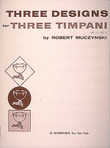Details
-
- Instrument:
- Percussion Timpani
- Genres:
- 20th Century Contemporary
- Composers:
- Elliott Carter
-
- Artist:
- Elliott Carter
- Item types:
- Physical
- Usages:
- School and Community
SKU: HL.50234240
(One Player). Composed by Elliott Carter. Percussion Works. Includes Recitative and Improvisation. Classical, Contemporary. 24 pages. G. Schirmer #AMP6820. Published by G. Schirmer (HL.50234240).ISBN 9780793548484. UPC: 073999342406. 9.0x12.0x0.066 inches.
These Eight Pieces For Four Timpani are great fun to play for the advanced percussionist. Detailed performance notes are included by Elliot Carter regarding the size of timpani, sticks and stick strokes, special effects and articulation.
Programme Note
The Canto and Adagio of this set of Eight Pieces for Four Timpani (One Player) were written in 1966, while the other six were composed in 1949. In those days, these six were found difficult, if not impossible to play effectively, but, as time passed interest in them and performing skills grew, so I decided to publish the set complete, as four of them had been widely circulated in manuscript, in 1966. At that time, they were revised with the help of the percussionist, Jan Williams, of the New York State University at Buffalo. In gratitude for his advice, the Canto and Adagio were composed for him and included the set. Unlike the other, each of which is a four-note piece based on different tunings of the drums, these two employ the possibilities of the pedal-tuned chromatic timpani.
The six from 1949, besides being virtuoso solos for the instrumentalist, are studies in the controlled, interrelated changes of speed now called Òmetric modulation,Ó and generated ideas carried further in my First String Quartet begun at the same time and completed shortly afterwards. Each piece is dedicated to a performer who showed an interest in the works in their early days:
I. Saeta (1949/1966) Ð Al Howard Ð An Andalusian song of improvisatory character sung during an outdoor religious procession, usually at Easter; said to be the descendent of a rain ceremony during which an arrow (saeta) was shot into the clouds to release the rain
II. Moto Perpetuo (1949/1966) Ð Paul Price Ð A rapid patter of notes of equal length, broken up into phrases of constantly changing accentuation, played with special, small, light drum sticks.
III. Adagio (1966) Ð Jan Williams Ð Uses pedal tuned timpani to produce vibratos, harmonics and glissandos in dramatic outburst.
IV. Recitative (1949/1966) Ð Morris Lang Ð Short contrasting phrases, one of which is condensed into the irregularly repeated major third in the latter part and punctuated by another phrase that disintegrates
V. Improvisation (1949/1966) Ð Paul Price Ð The opening phrase furnishes materials for numerous variations with constant changes of speed.
VI. Canto (1966) Ð Jan Williams Ð Uses pedal tuned timpani played by snare drum sticks in a line that slides from one pitch to another.
VII. Canaries (1949/1966) Ð Raymond DesRoches Ð A dance of the XVI and XVII centuries, ancestor of the gigue, supposedly imported from the Òwild menÓ of the Canary Islands; in 6/8 time with dotted rhythms-here fragmented and developed.
VIII. March (1949/1966) Ð Saul Goodman Ð Two march rhythms of different speeds are superimposed, one played with the butts, the other with the heads of the drum sticks. These produce musical ideas expanded in the middle section.
--Elliott Carter.
SKU: HL.50234240
(One Player). Composed by Elliott Carter. Percussion Works. Includes Recitative and Improvisation. Classical, Contemporary. 24 pages. G. Schirmer #AMP6820. Published by G. Schirmer (HL.50234240).ISBN 9780793548484. UPC: 073999342406. 9.0x12.0x0.066 inches.
These Eight Pieces For Four Timpani are great fun to play for the advanced percussionist. Detailed performance notes are included by Elliot Carter regarding the size of timpani, sticks and stick strokes, special effects and articulation.
Programme Note
The Canto and Adagio of this set of Eight Pieces for Four Timpani (One Player) were written in 1966, while the other six were composed in 1949. In those days, these six were found difficult, if not impossible to play effectively, but, as time passed interest in them and performing skills grew, so I decided to publish the set complete, as four of them had been widely circulated in manuscript, in 1966. At that time, they were revised with the help of the percussionist, Jan Williams, of the New York State University at Buffalo. In gratitude for his advice, the Canto and Adagio were composed for him and included the set. Unlike the other, each of which is a four-note piece based on different tunings of the drums, these two employ the possibilities of the pedal-tuned chromatic timpani.
The six from 1949, besides being virtuoso solos for the instrumentalist, are studies in the controlled, interrelated changes of speed now called Òmetric modulation,Ó and generated ideas carried further in my First String Quartet begun at the same time and completed shortly afterwards. Each piece is dedicated to a performer who showed an interest in the works in their early days:
I. Saeta (1949/1966) Ð Al Howard Ð An Andalusian song of improvisatory character sung during an outdoor religious procession, usually at Easter; said to be the descendent of a rain ceremony during which an arrow (saeta) was shot into the clouds to release the rain
II. Moto Perpetuo (1949/1966) Ð Paul Price Ð A rapid patter of notes of equal length, broken up into phrases of constantly changing accentuation, played with special, small, light drum sticks.
III. Adagio (1966) Ð Jan Williams Ð Uses pedal tuned timpani to produce vibratos, harmonics and glissandos in dramatic outburst.
IV. Recitative (1949/1966) Ð Morris Lang Ð Short contrasting phrases, one of which is condensed into the irregularly repeated major third in the latter part and punctuated by another phrase that disintegrates
V. Improvisation (1949/1966) Ð Paul Price Ð The opening phrase furnishes materials for numerous variations with constant changes of speed.
VI. Canto (1966) Ð Jan Williams Ð Uses pedal tuned timpani played by snare drum sticks in a line that slides from one pitch to another.
VII. Canaries (1949/1966) Ð Raymond DesRoches Ð A dance of the XVI and XVII centuries, ancestor of the gigue, supposedly imported from the Òwild menÓ of the Canary Islands; in 6/8 time with dotted rhythms-here fragmented and developed.
VIII. March (1949/1966) Ð Saul Goodman Ð Two march rhythms of different speeds are superimposed, one played with the butts, the other with the heads of the drum sticks. These produce musical ideas expanded in the middle section.
--Elliott Carter.
Ratings + Reviews
- Explain exactly why you liked or disliked the product. Do you like the artist? Is the transcription accurate? Is it a good teaching tool?
- Consider writing about your experience and musical tastes. Are you a beginner who started playing last month? Do you usually like this style of music?
- Feel free to recommend similar pieces if you liked this piece, or alternatives if you didn't.
- Be respectful of artists, readers, and your fellow reviewers. Please do not use inappropriate language, including profanity, vulgarity, or obscenity.
- Avoid disclosing contact information (email addresses, phone numbers, etc.), or including URLs, time-sensitive material or alternative ordering information.
- We cannot post your review if it violates these guidelines. If you have any suggestions or comments on the guidelines, please email us.
- All submitted reviews become the licensed property of Sheet Music Plus and are subject to all laws pertaining thereto. If you believe that any review contained on our site infringes upon your copyright, please email us.
- Read Sheet Music Plus's complete Privacy Policy
Tell A Friend
Tell a friend (or remind yourself) about this product. We'll instantly send an email containing product info and a link to it. You may also enter a personal message.
We do not use or store email addresses from this form for any other purpose than sending your share email.
Read our Privacy Policy.
Learn about MP3s
Learn about Smart Music
Learn about Digital Video
You may also like
-
$10.99
-
$19.95
-
$20.00
-
$6.00
-
$5.00
-
$16.99
-
$28.99
-
$24.95
-
$16.99
-
$3.00
-
$13.00
-
$20.99
-
$16.00
-
$7.99
-
$37.99
-
$31.95
-
$19.95
-
$9.95
-
$9.95
-
$7.50
Recommended Products Based on 8 Pieces for 4 Timpani
-
$4.99
-
$3.50
-
$9.99
-
$28.99
-
$8.95
-
$5.99
-
$8.99
-
$7.99
-
$10.99
-
$5.00
-
$4.99
-
$9.99
-
$5.00
-
$5.50
-
$4.99
-
$4.99
-
$4.99
-
$10.00
-
$10.99
-
$11.99
Top-selling in Percussion
-
$19.99
-
$20.95
-
$20.95
-
$39.95
-
$175.00
-
$170.00
-
$3.95
-
$4.95
-
$30.00
-
$69.95
-
$69.95
-
$3.99
-
$3.99
-
$39.95
-
$39.95
-
$125.00
-
$125.00
-
$125.00




























































